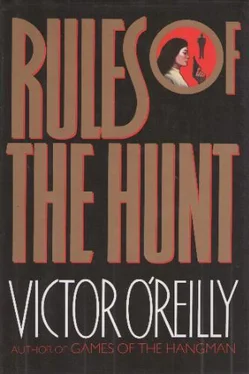Victor O'Reilly - Rules of The Hunt
Здесь есть возможность читать онлайн «Victor O'Reilly - Rules of The Hunt» весь текст электронной книги совершенно бесплатно (целиком полную версию без сокращений). В некоторых случаях можно слушать аудио, скачать через торрент в формате fb2 и присутствует краткое содержание. Жанр: Триллер, на английском языке. Описание произведения, (предисловие) а так же отзывы посетителей доступны на портале библиотеки ЛибКат.
- Название:Rules of The Hunt
- Автор:
- Жанр:
- Год:неизвестен
- ISBN:нет данных
- Рейтинг книги:4 / 5. Голосов: 1
-
Избранное:Добавить в избранное
- Отзывы:
-
Ваша оценка:
- 80
- 1
- 2
- 3
- 4
- 5
Rules of The Hunt: краткое содержание, описание и аннотация
Предлагаем к чтению аннотацию, описание, краткое содержание или предисловие (зависит от того, что написал сам автор книги «Rules of The Hunt»). Если вы не нашли необходимую информацию о книге — напишите в комментариях, мы постараемся отыскать её.
Rules of The Hunt — читать онлайн бесплатно полную книгу (весь текст) целиком
Ниже представлен текст книги, разбитый по страницам. Система сохранения места последней прочитанной страницы, позволяет с удобством читать онлайн бесплатно книгу «Rules of The Hunt», без необходимости каждый раз заново искать на чём Вы остановились. Поставьте закладку, и сможете в любой момент перейти на страницу, на которой закончили чтение.
Интервал:
Закладка:
Yoshokawa smiled. "I hope so," he said. "It was a decision not made lightly, but I know what you did before, and in some matters we need help. We cannot always do things the Japanese way. We must join the world."
"Internationalization," said Fitzduane.
Yoshokawa laughs. "Fitzduane- san," he said. "You are learning.
14
Tokyo, Japan
June 8
Fitzduane was glad that his first real contact with Japan had been at Kamakura.
As Yoshokawa's car drove into the vast sprawl of Tokyo itself, he became somewhat depressed at the seemingly endless vista of unlovely concrete-and-steel boxes, overhead cables snaking everywhere, and incessant neon. Most of the buildings gave the impression of having been roughed out on the back of an envelope and built in a hurry. Functionality alone seemed to have been the guideline, and frequently not even that. Many of the buildings were just plain shoddy.
Except for occasional touches – a roof upturned at its corners, the rich blue of a tile, a roadside shrine – there was almost no trace of the aesthetically satisfying blend of form and function which had been so evident in the temples of Kamakura. The visual sense of the Japanese seemed to have atrophied over the centuries, or perhaps had been one of the casualties of the war. However, it was not entirely dead, Fitzduane mused. The slick design of so much of Japanese electronic gadgetry was proof of that. Personally, Fitzduane thought it was a poor exchange.
Yoshokawa read his expression. "Fitzduane- san," he said, "don't read too much into what you see. The ugliness of so much of the buildings is superficial. Tokyo's character comes from its people and their energy. As to buildings, remember that the city was practically destroyed in the 1923 earthquake and no sooner rebuilt than it was virtually flattened by American bombers in the war. And we are due another earthquake! In this context, perhaps buildings are not so important." He smiled.
Fitzduane laughed out loud. "And for this kind of security, I hear you have the highest land and property prices in the world."
"This is true," said Yoshokawa. "Land is sacred to the Japanese because we are brought up to think we have so little of it. Also, property is used as security for so many financial transactions. Accordingly, our land prices have become insane. Based upon current paper value, merely by selling off Tokyo you could theoretically buy all of America. Just by selling the grounds of the ImperialPalace in the center of Tokyo, you could buy Canada!"
"The Namakas made much of their money through property, I gather," said Fitzduane.
"What was a worthless bomb site after the war was worth many millions or even billions of yen a generation later," replied Yoshokawa. "The Namakas specialized in persuading people to sell. An unwilling owner might find his child missing for a couple of days or have a car accident or simply vanish. It was all done with great subtlety. On several major projects, their opposition was conveniently attacked by right-wing terrorists – Yaibo – and there was no direct link at all. But conveniently, the Namakas benefitted."
"And Hodama?" said Fitzduane.
"Identified projects, made connections, and above all, provided political protection," said Yoshokawa, "but always secretly."
As they drove through what Yoshokawa assured him was metropolitan Tokyo, Fitzduane saw frequent patches of what looked like agricultural land. Some were in rice paddies. Others were planted with fruit or vegetables. "Given the scarcity of land for building," he said, "what are farms doing in the center of the city?"
Yoshokawa was amused. "More than five percent of Tokyo is still zoned for agriculture," said Yoshokawa. "The high price of land is not due merely to market forces. It is partially artificial. There are vested interests who want land prices driven up, even if it means the average sarariman can no longer afford to buy a house in the city and has to commute for three hours every day. There is a substantial political element in the land equation."
Fitzduane was silent. Most Japanese probably worked their guts out to achieve some extraordinary economic results, but much of the wealth which should accrue to the individual as a result was being siphoned off. He closed his eyes. He could almost see the web of politicians and organized crime feeding off the nation. It was a situation far from unique to Japan, but the scale of it in that country was frightening. And those who had access to such wealth and power would not give it up lightly.
He realized that the Namakas were not acting just on their own. They were part of a corrupt but extremely powerful structure – and most of it was invisible. Tatemae and honne, the public image and the private reality.
Chifune had explained it to him on the plane. "Loosely expressed," said Chifune, " tatemae is the public facade, the official position or party line. Honne, which literally means ‘honest voice,’ is the private reality. Tatemae and honne work together. Too much honne would create friction and could destroy the harmony of the group. Tatemae is the polite friction which smoothes the way. In Japan, if the truth is likely to be hurtful or destructive, tatemae will always be preferred. It is often thought by Westerners that tatemae is hypocrisy or dishonesty. It really is not. It is a social convention understood by all Japanese. It is a problem only for gaijin.
So who and what was he really up against? Whom could he really trust?
"Yoshokawa- san," he said, "do you really think Gamma can make a difference, or are the forces against you just too entrenched?"
Yoshokawa looked across and smiled somewhat wearily. "I have to believe we can," he said, "with a little help."
They approached the very center of Tokyo.
Fitzduane expected a high-rise hotel abutting on a crowded city-center street, but the Fairmont was a surprise. The architecture was unspectacular – it had a postwar utilitarian feel about it and had obviously been extended upward – but the location was superb. It was set well back from the road, with a park in front, and it was just outside the grounds of the ImperialPalace. Trees and flowers were everywhere. He caught a glimpse of water. It was the palace moat.
"The Americans did such a good job of bombing Tokyo," said Yoshokawa, "that there was a serious shortage of accommodation. The Fairmont was built and equipped not long after the war, primarily to house American officers – so the beds are the right size for you oversized gaijin." He smiled. "I think you'll like it. It has what you asked for – character. Whatever that is."
"It is something you have, Yoshokawa- san," said Fitzduane, taking his time with his words.
Yoshokawa smiled slightly and gave a slight bow in acknowledgment. Through his police connections, he had read the account of Fitzduane's adventures in Switzerland and was beginning to see why the man had been successful. The man had a sensitivity, a warmth. Unlike so many gaijin who were overly aggressive in tone and style, he understood the fundamental importance of ninjo – human feelings. He had a quick sense of humor and he was a good listener. Though he was a big man, he did not appear to be physically dangerous in any way, though the evidence said otherwise. If anything, his manner was gentle.
Yoshokawa was recognized instantly. Though his company was not as large as Sony, it had a similar profile and Yoshokawa was widely considered to be responsible for a great deal of its postwar success. He was a public figure and he regularly appeared in the media. For him to drive a guest personally to the hotel was an honor. There was much bowing and smiling. Fitzduane basked in the reflected glory. It was quite fun. He was whisked up to his room. Some packages had arrived for him by courier from the Irish Embassy and had been placed at the end of his bed.
Читать дальшеИнтервал:
Закладка:
Похожие книги на «Rules of The Hunt»
Представляем Вашему вниманию похожие книги на «Rules of The Hunt» списком для выбора. Мы отобрали схожую по названию и смыслу литературу в надежде предоставить читателям больше вариантов отыскать новые, интересные, ещё непрочитанные произведения.
Обсуждение, отзывы о книге «Rules of The Hunt» и просто собственные мнения читателей. Оставьте ваши комментарии, напишите, что Вы думаете о произведении, его смысле или главных героях. Укажите что конкретно понравилось, а что нет, и почему Вы так считаете.




![Беар Гриллс - The Hunt [=The Devil's Sanctuary]](/books/428447/bear-grills-the-hunt-the-devil-s-sanctuary-thumb.webp)







